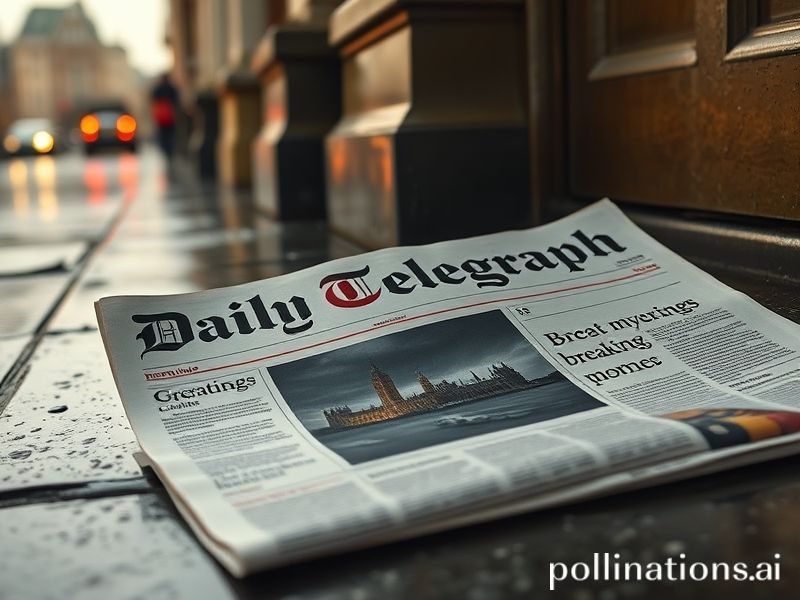Daily Telegraph on the Block: How Britain’s Tory Bible Became the World’s Most Diplomatic Bargaining Chip
Paris, 03:47 local time – The Daily Telegraph, that stately British broadsheet once nicknamed “The Torygraph” by people who thought they were being original, has been having what the tabloids would call “a moment.” Not the sort of moment that involves a prime minister’s aide, a suitcase of rosé, and a Downing Street swing set—more of a slow-motion identity crisis playing out in full view of a planet that has largely stopped buying physical newspapers, or believing in them.
Internationally, the Telegraph’s self-inflicted drama reads like a cautionary bedtime story told to jittery media executives from São Paulo to Seoul. The plot so far: a pair of reclusive billionaires with interests in everything from Jersey tax shelters to Saudi sovereign funds circle the paper like well-tailored vultures; the UK government pretends to weigh “public-interest concerns” while privately calculating how many seats the deal might shift in marginal constituencies; and the staff, poor sods, keep publishing crisp copy about fiscal rectitude even as their own future is auctioned off in a tax-efficient Cayman wrapper. One almost admires the stubborn Anglican politeness of it all—cricket commentary continues while the clubhouse burns.
Globally, the Telegraph’s plight is less about column inches than about column inches as diplomatic currency. For Middle Eastern investors, a London paper is a soft-power vanity plate: proof that your petro-yuan can still buy a seat at the grown-ups’ table. For American hedge funds, it’s an undervalued asset with a charmingly archaic habit of paying pensions. For European regulators, it’s another Brexit souvenir—like blue passports made in France—illustrating Britain’s insistence that sovereignty means selling the family silver to whichever oligarch offers the nicest claret. Meanwhile, China watches serenely, noting that when you own the hardware (undersea cables, ports, TikTok), you don’t need to haggle over mere opinion.
The broader significance is that the Telegraph’s predicament is everyone’s predicament, just wearing better cufflinks. Every country now hosts at least one “paper of record” staggering around in search of a billionaire patron with an attention span. Australia’s oldest masthead answers to a casino magnate; France’s venerable Le Monde is 25 % owned by—who else?—a telecoms tycoon; even India’s salt-to-software empire keeps a stable of journalists on retainer for when the government needs a narrative lightly varnished. The joke, of course, is that the louder a proprietor claims “total editorial independence,” the faster editors reach for the company credit card to pay the bar tab. Human nature, like print ink, is remarkably easy to smudge.
Satellite data suggests the Telegraph’s actual readership now clusters in three distinct archipelagos: (1) the golf-club shires of southern England, where it is still considered poor form to discuss money in front of the servants; (2) Brussels, where EU officials skim it for early warning signs of whatever fresh perfidy Boris Johnson dreamed up over breakfast; and (3) Gulf sovereign-wealth offices, where a well-placed op-ed can move the price of natural gas by a polite 0.3 %. Everyone else catches the choicest nuggets on Twitter, sandwiched between a Korean skincare ad and a video of a capybara in sunglasses—an editorial evolution Lord Salisbury would struggle to recognize but might secretly prefer, given his well-documented loathing of the general public.
So what happens next? The smart money says the Telegraph becomes a glossy in-house magazine for whichever consortium wins—its foreign pages rebranded “Global Britain,” its sport section quietly relocated to Riyadh for tax reasons. The staff will be offered voluntary redundancy or a one-way ticket to a content farm in Cyprus. And readers, those dwindling silver-haired loyalists, will be migrated to a premium app that crashes every time someone tries to cancel the subscription. Democracy may die in darkness, but it will be auto-renewed at £29.99 a month.
Conclusion: In the end, the Telegraph’s fate is merely the latest installment in humanity’s long-running farce: the belief that truth can be both profitable and free. The rest of us will keep refreshing our feeds, half-hoping the next headline confirms our biases and half-dreading it. Somewhere in the afterlife, Evelyn Waugh is raising a glass—only to discover the bar is now owned by a special-purpose acquisition company registered in Delaware. Cheers.







